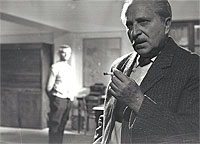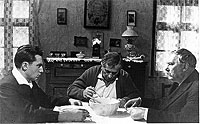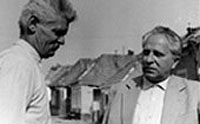 Húsz óra
Húsz óra
Hungary, 1965, black and white, 110 mins
The investigative narrative and flashback structure of Orson Welles’ Citizen Kane has been used more than once to frame a central European political subject. The best-known example is Andrzej Wajda’s Man of Marble (Człowiek z marmuru), written in 1963 but not filmed until 1976, but Zoltán Fábri’s Twenty Hours is in many ways its Hungarian equivalent. Here, an unnamed young journalist (Emil Keres) decides to disinter the story of a village murder that happened nine years previously (i.e. in 1956, a detail never stressed but which few contemporary viewers would have missed), by going to the scene of the crime and spending twenty hours interviewing anyone who’ll speak to him about what happened. He ends up with a vast array of personal anecdotes stretching back to World War II, with much stress placed on the upheavals of the early years of collectivisation and Stalinism.
The officially recorded facts appear to be as follows: collective farm worker Béni Kocsis (Ádám Szirtes) was murdered by local Communist Party secretary Sándor Varga (László György), who was subsequently expelled from the village. But the circumstances leading up to the murder are intertwined with a longstanding political struggle between village chairman Jóska Elnök (Antal Páger) and his current and former comrades. In 1945, they “looked to the future, just as after rain, one breathes from the air”, but the introduction of socialism and collectivisation has had mixed results. Some objected to it from the start – when the village assets are divided up according to need (those with more children get more land), György Venczel (János Makláry) protests that he never touched anyone’s property, and wants witnesses to the effect that Jóska forced him to sign the relevant documents: his caution is understandable, given the upheavals he’s presumably lived through as an adult, from 1919-45. András Csuha (József Bihari) is initially more accommodating, dictating a speech so flowery (“I, a homeless have-not, living in misery with six children, have taken twelve acres, and my share can only be taken away at the cost of my life”) that he later has it framed.

But his disillusion gradually grows when he realises that the co-op officials lack any feeling for poetry, or the primal thrill that comes with the first bloom in spring: they’re only interested in productivity and targets. Kiskovács (Lajos Őze) resents the fact that he helped give his comrades a leg-up, only to end up with no qualifications himself, while Anti Balogh (János Görbe) is unofficially declared “the people’s enemy” for having the temerity to break with the party after being accused of hoarding food – first, he announces that he no longer wishes to be addressed as ‘comrade’, and then confronts a policeman, baring his chest and daring him to shoot.
Jóska (who is trying to persuade the villagers to approve a major drainage scheme to give long-term protection at the cost of short-term pain that few are willing to countenance) has the unappetising task of holding all these factions together, though there are plenty of poisonous rumours doing the rounds about his own past. These tensions come to a head when during a confrontation at his own home, someone shoots at him through the window, the bullet missing his head by inches. Jóska doesn’t know who the mystery assailant is, but the fact that his dog didn’t bark suggests (correctly) that he’s a former friend.
All this is told in a series of Kane-like flashbacks, often presenting the same event from two different, sometimes opposing viewpoints, and some interviewees are reluctant to divulge anything at all. The doctor who pronounced Kocsis dead (Gyula Bodrogi) spends more time showing the journalist round his basement pad (decked out like a 1960s bar, with jazz and Edith Piaf on the stereo) than in actually answering any questions: he was obliged to treat victims of political violence because of the Hippocratic Oath, but he stresses that this doesn’t commit him to any cause. Parents of major players in the murder saga are often more forthcoming than their offspring, largely because they bring a sense of historical perspective, though in one case a man holds Jóska personally responsible for his father’s decline and death after he sacked him. (This is one of the most striking sequences in the film, stacked with charged symbolism, including the revelation that there was a tradition of bosses and underlings serving themselves from the same pot, but only those in charge were allowed to take the meat). The man urges the journalist not to print his name, because he’s already spent nine years in jail – again, the clear implication is that this happened in 1956 or shortly afterwards.

According to an interview with cinematographer György Illés by John Cunningham and Beata Barna, the film was originally edited in sequence, the final structure being devised after early criticism that the film felt too slow. One immediately useful by-product of the use of flashbacks from multiple viewpoints is that it gives Fábri the option to return repeatedly to powerful visual motifs, especially the bullet holes in Béni’s door and Jóska’s wall – often emphasised through the use of shock-cuts (such as during a meeting when it’s pointed out that everybody has enemies). Another repeated motif is the journalist napping in a nearby meadow, his papers strewn into disorder by the wind as though making sense of them is a futile exercise.
By the film’s appropriately ambiguous and inconclusive ending, we have learned a huge amount about the village and everyone in it, but are none the wiser about what makes everything tick – the implication being that the events of 1956 could easily happen again. If the film is occasionally frustratingly opaque to the present-day viewer, this is historically justified by the fact that Fábri was taking advantage of a recent relaxation of censorship, but presumably still felt inhibited about speaking out too loudly. Even oblique references to 1956 would have flirted with taboo, and many of Fábri’s contemporaries favoured a much more allegorical approach – such as Miklós Jancsó with The Round-Up (Szegénylegények) the same year.
- Director: Zoltán Fábri
- Screenplay: Miklós Köllő, based on the novel by Ferenc Sánta
- Photography: György Illés
- Production Design: József Romvári
- Costume Design: Judit Schäffer
- Editing: Ferencné Szécsényi
- Sound: Mihály Lehmann
- Production Manager: Ottó Föld
- Cast: Antal Páger (Jóska Elnök), János Görbe (Anti Balogh), Emil Keres (journalist), Ádám Szirtes (Béni Kocsis), László György (Sándor Varga), József Bihari (András Csuha), Lajos Őze (Kiskovács), János Makláry (György Vencel), Károly Kovács (the count), Gyula Bodrogi (the doctor), Ági Mészáros (Terus), Tibor Molnár (Máthé), Teri Horváth (Ilonka, Kocsis’ wife), Béla Barsi (board member), Ferenc Kiss, Sándor Siménfalvy, Ilka Petur, Noémi Apor, Ida Siménfalvy, Bertalan Solti, László Bánhidi, Sándor Szakács, Gyula Bakos, Teréz Bod, Antal Farkas, János Horkai, József Horváth, András Kern, Ibolya Péva, Gellért Raksányi, István Sztankay, Géza Tordy, Lajos Kelemen, Imre Sarlai, Pál Zoltán
- Production Company: MAFILM
Links
- Filmtörténet (in Hungarian, but with a video clip)
- Internet Movie Database